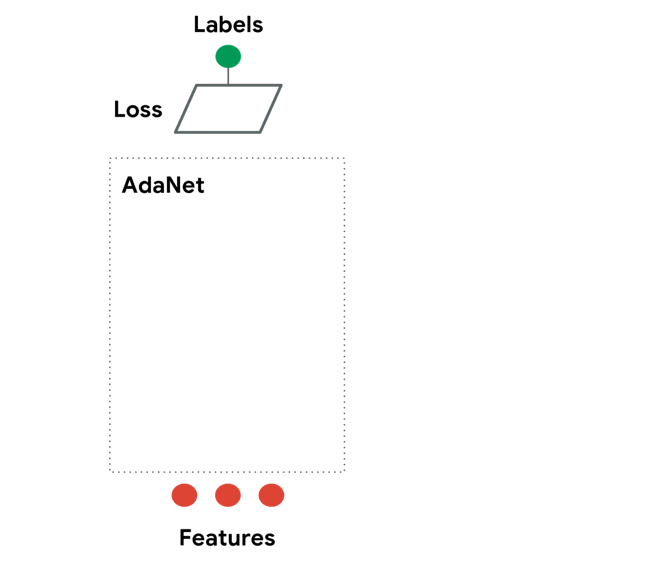Hello everyone,
I'm trying to apply AdaNet from tutorial in my local jupyter notebook, as I follow the tutorial here: https://github.com/tensorflow/adanet/blob/master/adanet/experimental/adanet_modelflow_tutorial.ipynb
System information
- Devices: Decktop PC
- Environment: Windows 10 Professional
- Running Platform: Anaconda
- Python version: 3.7
- Tensorflow version: 2.2 ( installed by
conda )
- CUDA/cuDNN version: 10.1, V10.1.243
- GPU: 1080Ti
Problem Description
I got the error: AttributeError: 'NoneType' object has no attribute 'logits'
I'm wondering where my code applying tutorial is wrong so that model can't be created.
Addition Information
Full Code
FEATURES_KEY = "x"
def input_fn(partition, training, batch_size):
"""Generate an input function for the Estimator."""
def _input_fn():
if partition == "train":
dataset = tf.data.Dataset.from_tensor_slices(({
FEATURES_KEY:
tf.log1p(X_train)
}, tf.log1p(y_train)))
else:
dataset = tf.data.Dataset.from_tensor_slices(({
FEATURES_KEY:
tf.log1p(X_test)
}, tf.log1p(y_test)))
# We call repeat after shuffling, rather than before, to prevent separate
# epochs from blending together.
if training:
dataset = dataset.shuffle(10 * batch_size,
seed=RANDOM_SEED)
dataset = dataset.batch(batch_size)
iterator = dataset.make_one_shot_iterator()
features, labels = iterator.get_next()
return features, labels
return _input_fn
_NUM_LAYERS_KEY = "num_layers"
class _SimpleDNNBuilder(adanet.subnetwork.Builder):
def __init__(self, optimizer, layer_size, num_layers, learn_mixture_weights,
seed):
self._optimizer = optimizer
self._layer_size = layer_size
self._num_layers = num_layers
self._learn_mixture_weights = learn_mixture_weights
self._seed = seed
def build_subnetwork(self,
features,
logits_dimension,
training,
iteration_step,
summary,
previous_ensemble=None):
input_layer = tf.to_float(features[FEATURES_KEY])
kernel_initializer = tf.glorot_uniform_initializer(seed=self._seed)
last_layer = input_layer
for _ in range(self._num_layers):
last_layer = tf.layers.dense(last_layer,
units=self._layer_size,
activation=tf.nn.relu,
kernel_initializer=kernel_initializer)
logits = tf.layers.dense(
last_layer,
units=logits_dimension,
kernel_initializer=kernel_initializer)
shared = {_NUM_LAYERS_KEY: self._num_layers}
return adanet.Subnetwork(last_layer=last_layer,logits=logits,complexity=self._measure_complexity(),shared=shared)
def _measure_complexity(self):
return tf.sqrt(tf.to_float(self._num_layers))
def build_subnetwork_train_op(self, subnetwork, loss, var_list, labels,
iteration_step, summary, previous_ensemble):
return self._optimizer.minimize(loss=loss, var_list=var_list)
@property
def name(self):
if self._num_layers == 0:
# A DNN with no hidden layers is a linear model.
return "linear"
return "{}_layer_dnn".format(self._num_layers)
class SimpleDNNGenerator(adanet.subnetwork.Generator):
def __init__(self,
optimizer,
layer_size=64,
learn_mixture_weights=False,
seed=None):
self._seed = seed
self._dnn_builder_fn = functools.partial(
_SimpleDNNBuilder,
optimizer=optimizer,
layer_size=layer_size,
learn_mixture_weights=learn_mixture_weights)
def generate_candidates(self, previous_ensemble, iteration_number,previous_ensemble_reports, all_reports):
num_layers = 0
seed = self._seed
if previous_ensemble:num_layers = previous_ensemble.subnetworks[-1].shared[_NUM_LAYERS_KEY]
if seed is not None:seed += iteration_number
return [
self._dnn_builder_fn(num_layers=num_layers, seed=seed),
self._dnn_builder_fn(num_layers=num_layers + 1, seed=seed),
]
#@title AdaNet parameters
LEARNING_RATE = 0.001 #@param {type:"number"}
TRAIN_STEPS = 60000 #@param {type:"integer"}
BATCH_SIZE = 32 #@param {type:"integer"}
LEARN_MIXTURE_WEIGHTS = False #@param {type:"boolean"}
ADANET_LAMBDA = 0 #@param {type:"number"}
ADANET_ITERATIONS = 3 #@param {type:"integer"}
def train_and_evaluate(experiment_name, learn_mixture_weights=LEARN_MIXTURE_WEIGHTS,
adanet_lambda=ADANET_LAMBDA):
model_dir = os.path.join(LOG_DIR, experiment_name)
ensembler_optimizer = None
if learn_mixture_weights:
ensembler_optimizer = tf.train.RMSPropOptimizer(
learning_rate=LEARNING_RATE)
estimator = adanet.Estimator(
# Since we are predicting housing prices, we'll use a regression
# head that optimizes for MSE.
head=tf.estimator.RegressionHead(),
# Define the generator, which defines our search space of subnetworks
# to train as candidates to add to the final AdaNet model.
subnetwork_generator=SimpleDNNGenerator(
optimizer=tf.train.RMSPropOptimizer(learning_rate=LEARNING_RATE),
learn_mixture_weights=learn_mixture_weights,
seed=RANDOM_SEED),
# The number of train steps per iteration.
max_iteration_steps=TRAIN_STEPS // ADANET_ITERATIONS,
# The evaluator will evaluate the model on the full training set to
# compute the overall AdaNet loss (train loss + complexity
# regularization) to select the best candidate to include in the
# final AdaNet model.
evaluator=adanet.Evaluator(
input_fn=input_fn("train", training=False, batch_size=BATCH_SIZE)),
ensemblers=[
adanet.ensemble.ComplexityRegularizedEnsembler(
optimizer=ensembler_optimizer,
# Lambda is a the strength of complexity regularization. A larger
# value will penalize more complex subnetworks.
adanet_lambda=adanet_lambda),
],
# Configuration for Estimators.
config=tf.estimator.RunConfig(
save_summary_steps=5000,
save_checkpoints_steps=5000,
tf_random_seed=RANDOM_SEED,
model_dir=model_dir)
)
# Train and evaluate using using the tf.estimator tooling.
train_spec = tf.estimator.TrainSpec(input_fn=input_fn("train", training=True, batch_size=BATCH_SIZE),max_steps=TRAIN_STEPS)
eval_spec = tf.estimator.EvalSpec(input_fn=input_fn("test", training=False, batch_size=BATCH_SIZE),steps=None,
start_delay_secs=1,
throttle_secs=30,
)
tf.estimator.train_and_evaluate(estimator, train_spec, eval_spec)
return estimator.evaluate(input_fn("test", training=False, batch_size=BATCH_SIZE),steps=None)
def ensemble_architecture(result):
architecture = result["architecture/adanet/ensembles"]
# The architecture is a serialized Summary proto for TensorBoard.
summary_proto = tf.summary.Summary.FromString(architecture)
return summary_proto.value[0].tensor.string_val[0]
Full Log
INFO:tensorflow:Using config: {'_model_dir': '.\\results\\20210305\\uniform_average_ensemble_baseline', '_tf_random_seed': 42, '_save_summary_steps': 5000, '_save_checkpoints_steps': 5000, '_save_checkpoints_secs': None, '_session_config': allow_soft_placement: true
graph_options {
rewrite_options {
meta_optimizer_iterations: ONE
}
}
, '_keep_checkpoint_max': 5, '_keep_checkpoint_every_n_hours': 10000, '_log_step_count_steps': 100, '_train_distribute': None, '_device_fn': None, '_protocol': None, '_eval_distribute': None, '_experimental_distribute': None, '_experimental_max_worker_delay_secs': None, '_session_creation_timeout_secs': 7200, '_service': None, '_cluster_spec': ClusterSpec({}), '_task_type': 'worker', '_task_id': 0, '_global_id_in_cluster': 0, '_master': '', '_evaluation_master': '', '_is_chief': True, '_num_ps_replicas': 0, '_num_worker_replicas': 1}
INFO:tensorflow:Using config: {'_model_dir': '.\\results\\20210305\\uniform_average_ensemble_baseline', '_tf_random_seed': 42, '_save_summary_steps': 5000, '_save_checkpoints_steps': 5000, '_save_checkpoints_secs': None, '_session_config': allow_soft_placement: true
graph_options {
rewrite_options {
meta_optimizer_iterations: ONE
}
}
, '_keep_checkpoint_max': 5, '_keep_checkpoint_every_n_hours': 10000, '_log_step_count_steps': 100, '_train_distribute': None, '_device_fn': None, '_protocol': None, '_eval_distribute': None, '_experimental_distribute': None, '_experimental_max_worker_delay_secs': None, '_session_creation_timeout_secs': 7200, '_service': None, '_cluster_spec': ClusterSpec({}), '_task_type': 'worker', '_task_id': 0, '_global_id_in_cluster': 0, '_master': '', '_evaluation_master': '', '_is_chief': True, '_num_ps_replicas': 0, '_num_worker_replicas': 1}
INFO:tensorflow:Not using Distribute Coordinator.
INFO:tensorflow:Not using Distribute Coordinator.
INFO:tensorflow:Running training and evaluation locally (non-distributed).
INFO:tensorflow:Running training and evaluation locally (non-distributed).
INFO:tensorflow:Start train and evaluate loop. The evaluate will happen after every checkpoint. Checkpoint frequency is determined based on RunConfig arguments: save_checkpoints_steps 5000 or save_checkpoints_secs None.
INFO:tensorflow:Start train and evaluate loop. The evaluate will happen after every checkpoint. Checkpoint frequency is determined based on RunConfig arguments: save_checkpoints_steps 5000 or save_checkpoints_secs None.
INFO:tensorflow:Using config: {'_model_dir': '.\\results\\20210305\\uniform_average_ensemble_baseline', '_tf_random_seed': 42, '_save_summary_steps': 5000, '_save_checkpoints_steps': 5000, '_save_checkpoints_secs': None, '_session_config': allow_soft_placement: true
graph_options {
rewrite_options {
meta_optimizer_iterations: ONE
}
}
, '_keep_checkpoint_max': 5, '_keep_checkpoint_every_n_hours': 10000, '_log_step_count_steps': 100, '_train_distribute': None, '_device_fn': None, '_protocol': None, '_eval_distribute': None, '_experimental_distribute': None, '_experimental_max_worker_delay_secs': None, '_session_creation_timeout_secs': 7200, '_service': None, '_cluster_spec': ClusterSpec({}), '_task_type': 'worker', '_task_id': 0, '_global_id_in_cluster': 0, '_master': '', '_evaluation_master': '', '_is_chief': True, '_num_ps_replicas': 0, '_num_worker_replicas': 1}
INFO:tensorflow:Using config: {'_model_dir': '.\\results\\20210305\\uniform_average_ensemble_baseline', '_tf_random_seed': 42, '_save_summary_steps': 5000, '_save_checkpoints_steps': 5000, '_save_checkpoints_secs': None, '_session_config': allow_soft_placement: true
graph_options {
rewrite_options {
meta_optimizer_iterations: ONE
}
}
, '_keep_checkpoint_max': 5, '_keep_checkpoint_every_n_hours': 10000, '_log_step_count_steps': 100, '_train_distribute': None, '_device_fn': None, '_protocol': None, '_eval_distribute': None, '_experimental_distribute': None, '_experimental_max_worker_delay_secs': None, '_session_creation_timeout_secs': 7200, '_service': None, '_cluster_spec': ClusterSpec({}), '_task_type': 'worker', '_task_id': 0, '_global_id_in_cluster': 0, '_master': '', '_evaluation_master': '', '_is_chief': True, '_num_ps_replicas': 0, '_num_worker_replicas': 1}
WARNING:tensorflow:Estimator's model_fn (<function Estimator._create_model_fn.<locals>._adanet_model_fn at 0x000002D952D3EE58>) includes params argument, but params are not passed to Estimator.
WARNING:tensorflow:Estimator's model_fn (<function Estimator._create_model_fn.<locals>._adanet_model_fn at 0x000002D952D3EE58>) includes params argument, but params are not passed to Estimator.
INFO:tensorflow:Calling model_fn.
INFO:tensorflow:Calling model_fn.
---------------------------------------------------------------------------
AttributeError Traceback (most recent call last)
<ipython-input-108-bdd9b905e372> in <module>
----> 1 results = train_and_evaluate("uniform_average_ensemble_baseline")
2 print("Loss:", results["average_loss"])
3 print("Architecture:", ensemble_architecture(results))
<ipython-input-107-6138e4940fa0> in train_and_evaluate(experiment_name, learn_mixture_weights, adanet_lambda)
59
60 eval_spec = tf.estimator.EvalSpec(input_fn=input_fn("test", training=False, batch_size=BATCH_SIZE),steps=None,)
---> 61 tf.estimator.train_and_evaluate(estimator, train_spec, eval_spec)
62
63 return estimator.evaluate(input_fn("test", training=False, batch_size=BATCH_SIZE),steps=None)
~\anaconda3\envs\tf-gpu\lib\site-packages\tensorflow_estimator\python\estimator\training.py in train_and_evaluate(estimator, train_spec, eval_spec)
470 '(with task id 0). Given task id {}'.format(config.task_id))
471
--> 472 return executor.run()
473
474
~\anaconda3\envs\tf-gpu\lib\site-packages\tensorflow_estimator\python\estimator\training.py in run(self)
611 tf.compat.v1.logging.info(
612 'Running training and evaluation locally (non-distributed).')
--> 613 return self.run_local()
614
615 # Distributed case.
~\anaconda3\envs\tf-gpu\lib\site-packages\tensorflow_estimator\python\estimator\training.py in run_local(self)
712 max_steps=self._train_spec.max_steps,
713 hooks=train_hooks,
--> 714 saving_listeners=saving_listeners)
715
716 eval_result = listener_for_eval.eval_result or _EvalResult(
~\anaconda3\envs\tf-gpu\lib\site-packages\adanet\core\estimator.py in train(self, input_fn, hooks, steps, max_steps, saving_listeners)
898 hooks=hooks,
899 max_steps=max_steps,
--> 900 saving_listeners=saving_listeners)
901 # In TensorFlow v2.0.0.rc1 and below, saving listeners are attached to
902 # the first CheckpointSaverHook each time train is called. Instead, we
~\anaconda3\envs\tf-gpu\lib\site-packages\tensorflow_estimator\python\estimator\estimator.py in train(self, input_fn, hooks, steps, max_steps, saving_listeners)
347
348 saving_listeners = _check_listeners_type(saving_listeners)
--> 349 loss = self._train_model(input_fn, hooks, saving_listeners)
350 logging.info('Loss for final step: %s.', loss)
351 return self
~\anaconda3\envs\tf-gpu\lib\site-packages\tensorflow_estimator\python\estimator\estimator.py in _train_model(self, input_fn, hooks, saving_listeners)
1180 return self._train_model_distributed(input_fn, hooks, saving_listeners)
1181 else:
-> 1182 return self._train_model_default(input_fn, hooks, saving_listeners)
1183
1184 def _train_model_default(self, input_fn, hooks, saving_listeners):
~\anaconda3\envs\tf-gpu\lib\site-packages\tensorflow_estimator\python\estimator\estimator.py in _train_model_default(self, input_fn, hooks, saving_listeners)
1209 worker_hooks.extend(input_hooks)
1210 estimator_spec = self._call_model_fn(features, labels, ModeKeys.TRAIN,
-> 1211 self.config)
1212 global_step_tensor = tf.compat.v1.train.get_global_step(g)
1213 return self._train_with_estimator_spec(estimator_spec, worker_hooks,
~\anaconda3\envs\tf-gpu\lib\site-packages\tensorflow_estimator\python\estimator\estimator.py in _call_model_fn(self, features, labels, mode, config)
1168
1169 logging.info('Calling model_fn.')
-> 1170 model_fn_results = self._model_fn(features=features, **kwargs)
1171 logging.info('Done calling model_fn.')
1172
~\anaconda3\envs\tf-gpu\lib\site-packages\adanet\core\estimator.py in _adanet_model_fn(***failed resolving arguments***)
2198 checkpoint_path=path,
2199 hooks=hooks,
-> 2200 best_ensemble_index_override=best_ensemble_index)
2201
2202 # Variable which allows us to read the current iteration from a
~\anaconda3\envs\tf-gpu\lib\site-packages\adanet\core\estimator.py in _create_iteration(self, features, labels, mode, config, is_growing_phase, checkpoint_path, hooks, best_ensemble_index_override)
2126 previous_ensemble_summary=previous_ensemble_summary,
2127 best_ensemble_index_override=best_ensemble_index_override,
-> 2128 previous_iteration=previous_iteration)
2129 return current_iteration, previous_iteration_vars
2130
~\anaconda3\envs\tf-gpu\lib\site-packages\adanet\core\iteration.py in build_iteration(self, base_global_step, iteration_number, ensemble_candidates, subnetwork_builders, features, mode, config, labels, previous_ensemble_summary, rebuilding, rebuilding_ensembler_name, best_ensemble_index_override, previous_iteration)
650 labels=labels,
651 previous_ensemble=previous_ensemble,
--> 652 config=config)
653 subnetwork_specs.append(subnetwork_spec)
654 # Workers that don't build ensembles need a dummy candidate in order
~\anaconda3\envs\tf-gpu\lib\site-packages\adanet\core\ensemble_builder.py in build_subnetwork_spec(self, name, subnetwork_builder, summary, features, mode, labels, previous_ensemble, config)
755
756 estimator_spec = _create_estimator_spec(self._head, features, labels,
--> 757 mode, subnetwork.logits,
758 self._use_tpu)
759
AttributeError: 'NoneType' object has no attribute 'logits'




